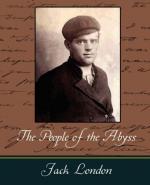I shall never forget the bitter wail of a blind man in a little East End shop at the close of a murky day. He had been the eldest of five children, with a mother and no father. Being the eldest, he had starved and worked as a child to put bread into the mouths of his little brothers and sisters. Not once in three months did he ever taste meat. He never knew what it was to have his hunger thoroughly appeased. And he claimed that this chronic starvation of his childhood had robbed him of his sight. To support the claim, he quoted from the report of the Royal Commission on the Blind, “Blindness is more prevalent in poor districts, and poverty accelerates this dreadful affliction.”
But he went further, this blind man, and in his voice was the bitterness of an afflicted man to whom society did not give enough to eat. He was one of an enormous army of blind in London, and he said that in the blind homes they did not receive half enough to eat. He gave the diet for a day:-
Breakfast—0.75 pint of skilly and dry bread.
Dinner —3 oz. meat.
1
slice of bread.
0.5
lb. potatoes.
Supper —0.75 pint of skilly and dry bread.
Oscar Wilde, God rest his soul, voices the cry of the prison child, which, in varying degree, is the cry of the prison man and woman:-
“The second thing from which a child suffers in prison is hunger. The food that is given to it consists of a piece of usually bad-baked prison bread and a tin of water for breakfast at half-past seven. At twelve o’clock it gets dinner, composed of a tin of coarse Indian meal stirabout (skilly), and at half-past five it gets a piece of dry bread and a tin of water for its supper. This diet in the case of a strong grown man is always productive of illness of some kind, chiefly of course diarrhoea, with its attendant weakness. In fact, in a big prison astringent medicines are served out regularly by the warders as a matter of course. In the case of a child, the child is, as a rule, incapable of eating the food at all. Any one who knows anything about children knows how easily a child’s digestion is upset by a fit of crying, or trouble and mental distress of any kind. A child who has been crying all day long, and perhaps half the night, in a lonely dim-lit cell, and is preyed upon by terror, simply cannot eat food of this coarse, horrible kind. In the case of the little child to whom Warder Martin gave the biscuits, the child was crying with hunger on Tuesday morning, and utterly unable to eat the bread and water served to it for its breakfast. Martin went out after the breakfasts had been served and bought the few sweet biscuits for the child rather than see it starving. It was a beautiful action on his part, and was so recognised by the child, who, utterly unconscious of the regulations of the Prison Board, told one of the senior wardens how kind this junior warden had been to him. The result was, of course, a report and a dismissal.”




